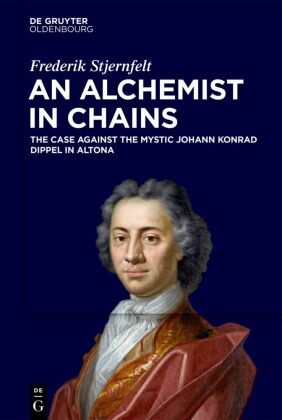An Alchemist in Chains - The Case Against the Mystic Johann Konrad Dippel in Altona
| Verlag | Oldenbourg |
| Auflage | 2024 |
| Seiten | 274 |
| Format | 16,3 x 2,0 x 23,6 cm |
| Gewicht | 527 g |
| Artikeltyp | Englisches Buch |
| ISBN-10 | 3111479722 |
| EAN | 9783111479729 |
| Bestell-Nr | 11147972A |
How could a pious, Christian mystic spread radical Enlightenment ideas and freedom of thought? Johann Konrad Dippel was a radical pietist, an alchemist, a philosopher, a medical doctor, a renegade, a firebrand. He was also one of the most-read authors of early eighteenth-century Europe.
Born at the Burg Frankenstein in the South of Germany, he was a truly cosmopolitan figure, straying between France, Berlin, the Netherlands, Denmark, Sweden, and various German states. From 1714-1719, he was in Altona near Hamburg, then the second city of Denmark-Norway. Here, a labyrinthine case was brought against him, terminating with his banishment to the Danish island of Bornholm in the Baltic Sea.
This book is the first to investigate in detail the Case Against Dippel in Altona, pitting him in a struggle against the strongest noble couple of Denmark-Norway, the Reventlows, presiding in Altona. It was a case involving libel, bribes, corruption, but also branching into blasphemy and gold-making.
The investigation of the Case Against Dippel is embedded in a narrative of what is known about his frantic life and defiant thought before and after his seven-years' incarceration. The whole story throws a new light upon the challenging question of the origin of Modernity and the clandestine connections between radical pietism and radical Enlightenment.
Rezension:
"This book offers a magnificent 'thick description' of the conflict between Dippel and the Reventlows - a paradigmatic analysis of arbitrary rulers and the possibilities and tribulations of a committed intellectual, regardless of whether you call him a spiritualist or a radical enlightenment thinker. Stjernfelt's art of portrayal turns the case into a reading pleasure that you cannot resist." - Martin Mulsow, Professor of Intellectual History at the University of Erfurt and Director of the Gotha Research Center
___
"Sometimes the most reasonable notions co-habit with radical, far-sighted and, even, plain crazy ideas. Giving the lie to the assumption that the Enlightenment was driven by pure rationalism uniformly pursued by its proponents, the social thinker, medic and alchemist, Johann Konrad Dippel is revealed to be almost hilariously versatile, well-travelled and engaged. Drawing out the many facets of Dippel's life and career by way of a forensic examinati on of his involvement in a frequently outrageous legal case brought against him by a royal couple in Altona, Frederik Stjernfelt's book provides a coruscating snapshot of Europe in the eighteenth century, the Enlightenment, the life of the court, the life of the mind and the pettiness of a society still mired in pietism." - Paul Cobley, Emeritus Professor in Language and Media, Middlesex University, London

